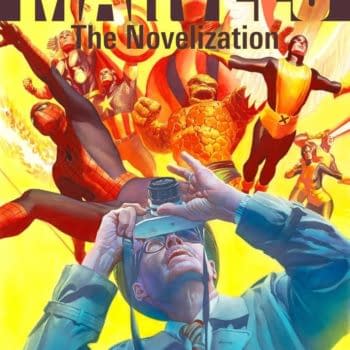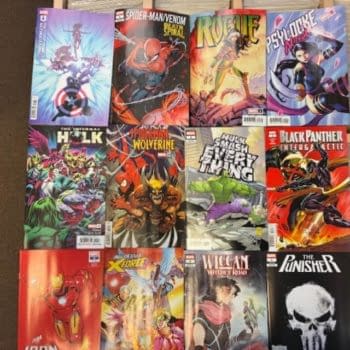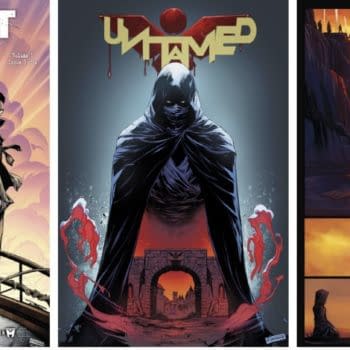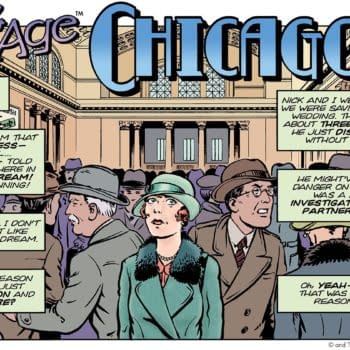Posted in: Comics | Tagged: battlestar galactica, Comics, dynamite, entertainment, Gods And Monsters, karl kesel
Karl Kesel Thinks That Battlestar Galactica Is Timeless
Karl Kesel talks to Byron Brewer about Battlestar Galactica: Gods and Monsters #3, on sale in January from Dynamite. Covers by Alec Morgan and Pete Woods.

KARL KESEL: Well, since I'm working on the re-imagined series, I don't feel it needs too much freshening. To me, the show feels just as fresh today as it did when it first aired. Can't quite put my finger on why— but this happens from time to time. I recently re-watched The Good, the Bad and the Ugly and was shocked by how modern it feels. Maybe "timeless" is a better word. Battlestar seems to have found that same, sweet spot. All I do is my best to keep that feeling.
BB: Sometimes when you begin writing a series, a character will become suddenly more important to the book than you thought might otherwise happen starting out. Is there a character in Gods and Monsters that has surprised you as far as getting more "panel time" than you first planned? And if so, what is it you like about this character?
KK: Simon has turned out to be much more interesting than I expected. There's a quiet strength to him that I don't think I fully understood or appreciated going into this assignment. And to be clear: I'm talking about the Simon who was the Resistance's medic on Caprica. Everyone who knows the show knows he doesn't survive for long once he's found out as a Cylon spy, but I think everyone will be surprised by how he dies. I know I was! It was an example of a character doing things I hadn't originally planned, but made complete sense and took that character's story in an unexpected direction.
BB: Tell us a little about Cavil.
KK: Cavil is probably my second favorite character after Baltar, in this story at least. Maybe because in some ways they're very similar! They are both extremely self-centered, but Cavil is more proactive while Baltar is very reactive. They both can be quite funny— Cavil in a cynical, blunt way, Baltar in a more smug, sometimes smarmy (and occasionally unintentional) way. Their biggest difference, however, is that Cavil has no interest in the spotlight. His primary interest is in getting what he wants, however that can be accomplished. Baltar, on the other hand, needs to be the center of attention. It is his great, fatal flaw. Baltar doesn't see himself as evil (and he isn't, really— he's more… thoughtless than evil, I'd say). On the other hand, Cavil doesn't care what others think of him. As long as they don't get in his way.
BB: Do you think there will come a time in this series where Baltar will actually regret "making" his Centurion? (I'm thinking about the literary face-off between Frankenstein and his creation.) I am loving this part of Gods and Monsters.
KK: I think Baltar ends up regretting just about every decision he makes at some point, to one degree or another. That's what happens when a person's stated intentions don't match their true intentions. The trouble with the Centurion is that it could really come back to hurt him— literally. I will say this: I don't think the Centurion has much respect for Baltar. And that sort of contempt for your "creator" can't bode well for Baltar…

KK: In all honesty, I'm not a huge fan of Star Wars. Some great characters and concepts— iconic at this point— but it's a fantasy story in a science-fiction setting— which simply isn't something I gravitate toward— while Battlestar is a war story in a science-fiction setting. Battlestar is much more rooted in the here and now than Star Wars— it certainly reflects our reality much more directly. Star Wars is about quests, Battlestar is about missions. Star Wars is about good and evil, Battlestar is about gray areas. Both have strong spiritual elements— but in Star Wars those elements are far more central, while in Battlestar they are simply another facet of the culture, and are open to different interpretations— again, much more like the world we live in now. I'm not sure how I would handle a Star Wars assignment, but I doubt I have to worry about it. There are plenty of extremely talented people who would be in line in front of me.
BB: How has it been working with artist Alec Morgan? He has certainly been hitting it out of the park, from what I have seen. Has there been any part of this series where you needed to send Alec reference material? Did he design the Centurion, and if so did you collaborate with him?
KK: Alec has been a joy to work with. His work is always stunning. I don't believe I've needed to supply him with any reference, and he came up with the rebuilt Centurion's design himself. I'm particularly impressed with how he came up with characters who evoke the actors on the show, without necessarily looking like them— essential, since we (unfortunately) don't have likeness rights. Lemons into Lemonade!
BB: Can you give us an unspoilery hint as to where Gods and Monsters is headed past issue #3?
KK: Nothing gets easier. Things get worse. And yes: the Cylons will attack. I don't think it'll surprise anyone to hear that Baltar's Centurion doesn't survive. The question is: when he goes down whose side is he on? To find out, stay tuned…














